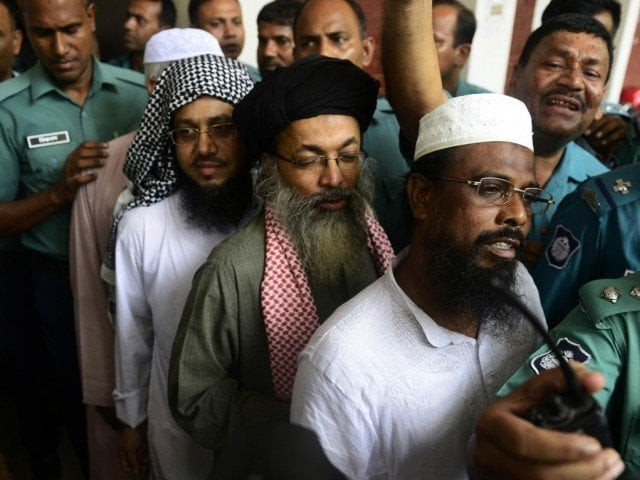Eight Bangladesh militants to hang for New Year bombing
Head of banned Harkatul Jihad al Islami outfit, Mufti Abdul Hannan, is among the eight sentenced to hang.

Eight Bangladesh militants to hang for New Year bombing
The head of the outlawed Harkatul Jihad al Islami (HuJI) outfit, Mufti Abdul Hannan, was among the eight sentenced to hang for planning and carrying out the bombing in Dhaka's main park.
It was one of the first deadly attacks by an extremist group in the country.
Metropolitan sessions judge Ruhul Amin also sentenced six others to life in prison for setting off two bombs under a tree while thousands of revellers celebrated the first day of the Bengali New Year in April 2001.
The attack was captured live on television, with the scenes of carnage triggering widespread outrage.
"The attack was carried out to destabilise the country and create panic," Judge Amin said as he delivered the verdict before a packed courtroom in Dhaka's old city.
"The first day of the Bengali New Year is a universal celebration. This celebration is not tied to any religious or political group," he added.
The Bengali New Year, celebrated on April 14, is the most important secular festival for the 155 million ethnic Bengalis in Bangladesh.
Hundreds of thousands traditionally gather and sing under a banyan tree in the capital's historic Ramna Park and the nearby grounds of Dhaka University.
Prosecutors said HuJI militants plotted the attack when they gathered at a mosque in Dhaka several weeks earlier.
"It was a heinous attack and unprecedented in our history," prosecutor Abdullah Abu told reporters after the verdicts were announced.
"We're happy with the eight death sentences, but not satisfied with the sentencing of six people who were given life terms. We'll appeal against the life sentences."
The HuJI chief, better known as Mufti Hannan, is already on death row after being convicted in 2008 of trying to assassinate the British high commissioner (ambassador) four years earlier in a grenade attack.
Bangladesh saw mass protests last year when several senior Jamaat leaders were sentenced to death after being convicted of war crimes dating back to the 1971 independence conflict.
On Tuesday the country's war crime court is set to deliver its latest verdict against the leader of the largest Islamic group Motiur Rahman Nizami for alleged atrocities during the 1971 war.
Experts say the death sentences against HuJI militants and their leader are unlikely to trigger new protests since the outfit ceased to be a major force after most of its leaders were arrested in a nationwide sweep back in 2005.
A lawyer for the defendants, Faruque Ahmed, told AFP he planned to appeal the verdicts which he said were politically motivated and designed to "make people happy in certain quarters".
Mufti Hannan, who fought alongside the Taliban in Afghanistan's civil war, is also accused of involvement in a 2004 plot to assassinate the current Prime Minister Sheikh Hasina when she was the opposition leader.
His organisation has also been linked to plots to blow up courts and other secular institutions, as well as Sufi shrines and a church.
The New Year bomb attack was among the first carried out by militant groups in Bangladesh, who want Sharia law introduced in place of the British origin common law.
The scale of the threat posed by militant groups was underlined in August 2005 when another banned outfit, Jamayetul Mujahideen Bangladesh (JMB), carried out more than 400 synchronised blasts in all but one of the country's 64 districts.
An elite security force was subsequently deployed to hunt down thousands of militants, including the top leadership of HuJI and the JMB. Six leaders of JMB were hanged in March 2007.
While there have been no major attacks by either since then, police say remnants of their networks are still operational.



















COMMENTS
Comments are moderated and generally will be posted if they are on-topic and not abusive.
For more information, please see our Comments FAQ